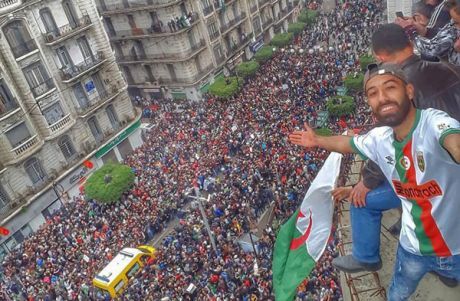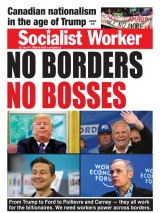Features
You are here
North Africa – from a democratic uprising to revolution

March 20, 2019
The massive protests that have gripped Algeria in recent weeks are inspiring.
They have forced president Abdelaziz Bouteflika to announce he will not seek re-election.
His prime minister Ahmed Ouyahia has also stepped down.
Ouyahia’s replacement, Noureddine Bedoui, has said he will set up a technocratic government in a desperate effort to head off the huge anger Algerians feel.
But ordinary people have defied these attempts to stifle them and have continued their protests.
Huge numbers protested last Friday against attempts by Bouteflika and his supporters to hold onto power.
The protests raise serious political questions about how to move from battles against a single dictator to a revolutionary movement that can transform society.
It’s a question that revolutionaries in Russia grappled with over a century ago. And they came up with answers that are still relevant today.
The Russian revolutionary leader Leon Trotsky developed the theory of permanent revolution to understand how a revolution could take place in Russia.
He went on to expand this into a general theory of how revolutions could happen in what we would now call the Global South.
The theory looks at how battles for democracy can “grow over” into struggles for more fundamental change.
It also points to the danger that if struggles don’t go deeper, much of the old oppression and exploitation will remain even if dictators fall.
For example, in the 1960s Algeria broke free from French colonialism after a long and heroic battle. This was a huge victory.
Control
But it did not transform society in the interests of workers and the poor because a section of the capitalist class took control of it.
In Russia at the time of the 1917 revolution, capitalists were tied to the old order.
Trotsky argued that because of this, and their political cowardice, the working class would have to be the agent of change.
Workers could launch a revolutionary process to get rid of the ruling Tsar. Trotsky said that, as part of this, they could also sweep aside the capitalist state and take over the running of society.
And through its bold action the working class could pull other oppressed groups in society into the struggle.
There are similar lessons for the revolutionary process in Algeria today. It is fully incorporated into the capitalist world system, but it is not one of its central economies. That was also true of Russia at the time of the revolution. Capitalism had developed in Russia in a specific way.
At the start of the 20th century the vast majority of the country was still in the grip of peasant production and landlord domination.
The exceptions to this were the huge factories created in the cities. Among these were some of the most advanced technologies on earth. For instance, the Putilov works was the most advanced factory of its kind at the time.
As Trotsky put it this saw, “The most concentrated industry in Europe based on the most backward agriculture in Europe.
“The most colossal state apparatus in the world making use of every achievement of modern technological progress in order to retard the historical progress of its own country.”
He called this contradictory process uneven and combined development. The pace of change in Russia was lightning fast compared to the decades and centuries over which capitalism had developed in countries such as Britain.
People flocked from the countryside to work in the cities. And, because of the intense concentration of capital in Russia, this new working class had immense power.
This power could help it to lead other classes, in particular the vast peasantry, in a struggle to bring down the tsar and to fight for a new kind of society.
The central demand of the movement in Algeria is the removal of Bouteflika.
There are also strong demands for more wide-ranging changes such as the redistribution of wealth.
If Bouteflika is simply replaced by a capitalist opponent, or some technocratic regime, and the movement comes off the streets, real change will be unlikely.
There is little wriggle room for the Algerian ruling class.
Industry
Falling commodity prices have hit the economy’s key sectors hard, particularly the natural gas industry.
This has seriously undermined the regime’s ability to maintain subsidies for essential goods and services.
And the Algerian ruling class is subservient to the interests of bigger imperial powers. That means none of its members can deliver the democratic and social change protesters and strikers are demanding.
Trotsky argued that in situations such as these, the self-activity of the working class is essential.
The working class is increasingly central to the uprising in Algeria. Strikes that began in schools and universities have spread to the textile and transport industries as well as the natural gas and oil industry.
These strikes can hit the ruling class’s profits and form the basis of a rival source of power to the people at the top.
In Algeria today millions of people are chanting, “The people demand the downfall of the regime.”
It has been a strong reminder of the process that saw dictators swept from power across the Arab world in 2010-11.
it is also a sobering reminder of the results of those revolutions.
Tunisia was the starting point of the Arab Spring that began eight years ago.
Today in Tunisia there are protests to demand an end of the poverty that helped spark the 2011 uprisings.
Those who protect the system hold up failed revolutions as evidence that all revolutions are doomed.
Dictators across the Middle East focus on Syria and the rise of Isis as one example.
But the uprisings in North Africa now show the alternative both to the present set-up and the carnage in Syria. The working class can potentially show a way forward.
The system’s cheerleaders cling to brutal dictators for fear of a more thoroughgoing movement.
In Egypt, dictator Abdel Fattah el-Sisi has detained tens of thousands and executed 15 in February this year alone. A Human Rights Watch report described use of torture as a “systematic practice”.
Yet Anwar Sadat—a relative of the former Egyptian president of the same name—has said, “Whether Sisi is the perfect choice or not, we have no choice but to have him succeed. Egypt cannot afford any other third revolution.”
Develop
Independent working class organisation and a revolutionary party are important to develop the potential for change now. They can guard against counter-revolution.
They can argue for the creation of richer forms of democracy such as workers’ councils and warn against trusting any section of capitalists.
Internationalism is also a central plank of Trotsky’s theory of permanent revolution for two main reasons.
Firstly, he recognised that the increasingly interconnected world system would mean that crises—political and economic—would increasingly have international effects.
Revolutionaries had to base their analysis on world processes, not conditions in a single country.
This was proven during the Arab Spring—revolution spread rapidly across the region. And it is proven today with the strikes and protests in Algeria, Sudan, Tunisia and Morocco.
And the second international element of the theory is that revolutions must spread if they are to succeed.
The revolutionary Karl Marx hinted at this in 1850 when he said, “It is our interest and our task to make the revolution permanent... Not only in one country but in all the leading countries of the world.” Trotsky’s genius was to identify these dynamics and to take action. He became a member of the Bolshevik Party, which took up the theory during the course of the revolution in 1917 and acted on it.
This meant a break from the assumed knowledge on the revolutionary left at the time.
Some specific aspects of Russia in 1917 may not be applicable now. But many of the central parts of Trotsky’s theory remain crucial.
This article is reposted from Socialist Worker UK.
Section:










